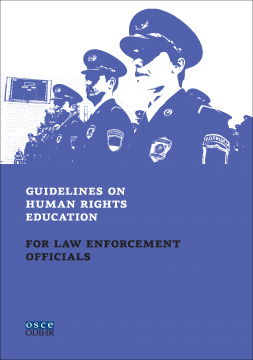Guidelines on Human Rights Education for Law Enforcement Officials

These guidelines aim to support systemic and effective human rights education for police and other law enforcement personnel. They were prepared on the basis of broad consultations involving police trainers, university lecturers, national human rights institutions and individuals involved in the design and delivery of educational curricula for law enforcement officials. The guidelines promote the objectives of the United Nation’s World Programme for Human Rights Education and its Second Phase (2010 to 2014), which focuses on implementing human rights training programmes for teachers and educators, civil servants, law enforcement officials and military personnel.
The document presents approaches to be adopted when planning or implementing human rights education for law enforcement personnel related to six key structural areas: the human rights-based approach to human rights education; core competencies; curricula; training and learning processes; evaluation; and professional development and support of educational personnel. The guidelines also offer a list of key materials to assist in planning, implementing and evaluating human rights education for law enforcement officials.
The views, opinions, conclusions and other information expressed in this document are not given nor necessarily endorsed by the Organization for Security and Co-operation in Europe (OSCE) unless the OSCE is explicitly defined as the Author of this document.
